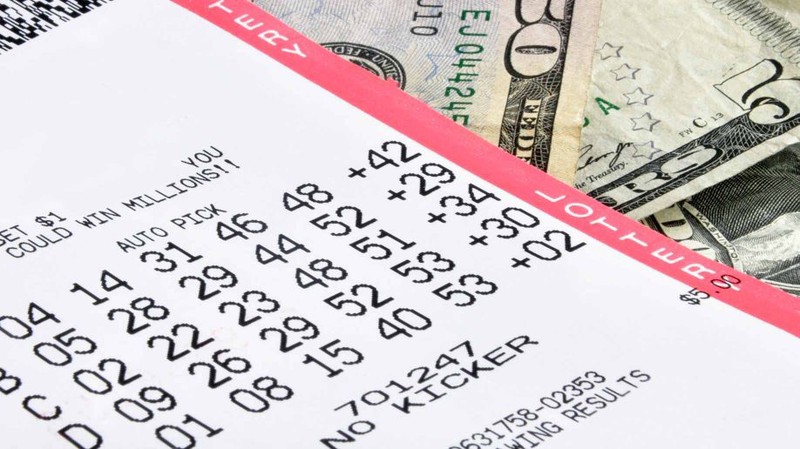
Believe it or not, to “win” the lottery, the best strategy really is to not play at all. But before you hit the back button, hear me out.
Winning the lottery, while a tempting dream of the get rich quick sect, is not a legitimate way to get rich. In fact, it’s really no different than gambling away your money in a casino, where the house almost always wins. With only a handful of winners versus millions and millions of losers, the lottery is a sucker’s game. If you want to be rich and have plenty of money in the bank in order to live the good life, don’t look to the lottery to make it happen!
Playing and “Winning” the Lottery
How the Powerball Lottery Works
This article focuses on the Powerball lottery, the largest lottery in the United States. Available in 42 states, Washington D.C., and the U.S. Virgin Islands, Powerball always has a jackpot of at least $20 million and has drawings twice a week. It is made up of five sets of 59 numerical white balls and one set of 39 red “Powerballs,” which make up the winning number combinations for each drawing.
Players can either choose their own six numbers (five regular and one Powerball) or have the computer terminals randomly pick numbers for them. If every number on your ticket matches the winning numbers in the order they are drawn, you win the jackpot prize. There are also smaller prizes if you only have some of the correct numbers. Each ticket costs the player $1.
The Powerball lottery holds the record for the largest lottery jackpot ever; in 2006, $365 million was awarded to eight people sharing one ticket.
Odds of Winning
What are the odds of buying a jackpot-winning lottery ticket? Well, that’s where the math gets scary. The odds of someone choosing the winning combination of numbers are 1 in 195,249,054. Yes, you read that right – just 1 in almost 200 million. To put that in some numerical perspective, the United States currently has a population of 307 million people, so you’re theoretically competing against 2/3 of the entire U.S. population. Those are serious odds stacked against you every time you spend $1 for a lottery ticket!
The odds for winning a smaller amount of money, like $10,000, for only getting a portion of the numbers correct, are also unfavorable: 1 in 723,144.64. Ouch.
Buying lottery tickets is not an efficient way to increase your personal wealth. For those of you who still think you can beat the odds, there actually is a strategy. The single surefire way to win money from playing the Powerball lottery is to buy 39 tickets, each one hand-picked to contain one of the unique Powerball numbers between 1 and 39. You are then guaranteed to at least win the $3 prize. Sure, it may have cost you $39, but this is one way to “win” the lottery.
In 2008, there were 1.03 deaths per 100 million vehicle miles traveled in the United States. Based on these odds, a lottery player living a single mile from a store selling lottery tickets is four times more likely to die in a car accident driving to the store than to win the Powerball jackpot. Winning doesn’t seem too likely now, does it? Keep those odds in mind the next time you drive to the store to buy lottery tickets!
The True Cost of Playing the Lottery
Learning more about the odds of winning a big jackpot may not be enough to discourage you from buying daily or weekly lottery tickets. Perhaps talking about the true financial cost of those tickets will help dissuade you from buying tickets. Most people do not like wasting money, but many will spend a small fortune on lottery tickets in their lifetimes, which is unlikely to ever pay off.
Lotteries have often been called a “tax on the poor,” and for good reason. The majority of lottery ticket buyers are in the lower income tax brackets. Often less educated about finances and less likely to save money for retirement, these lottery players don’t view the expense of a few lottery tickets as a major cash outlay. However, this couldn’t be further from the truth. In the long run, spending money on tickets that never win costs players more than just the face value of the tickets and prevents many people from ever getting out of debt.
To illustrate this point, let’s say an average lottery player spends $5 per week on Powerball tickets. That’s $20 each month or $240 spent on lottery tickets every year. This person buys lottery tickets every month of every year for 25 years, as my grandfather did throughout his adult life. The amount spent on lottery tickets over a lifetime is $6,000, which surely could have been put to better use. Instead, that $6,000 disappeared, and never won any jackpot big enough to cover the player’s expenses.
Now, what if that $20 had instead been socked away every month into an interest-bearing savings account, CD, or retirement investment, paying a conservative average of 5% per year? How much would that player have earned at the end of the 25-year period?
$12,027.23. That’s how much.
By depositing that $20 every month into an account earning just 5%, a lottery player could double his or her money in 25 years. Putting that money towards retirement, debt, or furthering your career with an education are all better ways to use your money, and with much better returns.
Winners Become Losers
With all this talk about the odds against winning and how much money is wasted on lottery tickets, one may forget that people do win the jackpot once in a great while. Every now and then, we read about someone who won a huge jackpot of a few hundred million dollars and how he or she is planning on retiring, buying a new car, or giving a percentage to a favorite charity.
But we rarely hear about what actually happens to these people. Do they live rich, successful lives? Remember, most lottery players have very little financial education or experience handling money. Here are a few examples of those who won major jackpots, only to lose it all:
Michael Carroll from the UK won a $15.4 million National Lottery jackpot in 2002, only to find himself unemployed and broke a few years later. He lost all the money on expensive gifts, drugs, prostitutes, and cars.
Evelyn Adams won the New Jersey lottery twice (1985 and 1986) for a total of $5.4 million, but lost every penny gambling it away in Atlantic City casinos. She currently lives in a trailer park.
Jay Sommers won one-fifth of a $28.9 million jackpot in Michigan and proceeded to spend the first annual check of $290,000 to buy five automobiles. After that, he hired a shady financial advisor (his friend), who swindled him out of the rest of his winnings. Sommers lost all of his winnings and resorted to delivering pizzas.

Final Word
Still not deterred from buying a few lottery tickets? You aren’t alone. Millions of people buy lottery tickets every week and don’t expect to win anything back; it’s just a game to them. Heck, I even buy a lottery ticket once in a while, just for kicks. But I never expect to actually win the jackpot, and I would never spend money I don’t have to try to beat such grand odds.
Buying lottery tickets for fun once in a while won’t break the bank. Playing with money you don’t have, or that you will need later on, however, is a recipe for disaster. For those who decide to play responsibly, the good news is that a portion of the money that goes towards state lotteries is used for education and children’s programs. The only responsible way to play the lottery is to do so occasionally for fun, without any expectation of winning. When it turns into something else, you know it’s time to stop.
What are your thoughts on winning the lottery? Do you play for fun, or to win it all one day?
If you’re still looking to play the lottery, check out TheLotto.com, an easy way to buy lottery tickets online from around the world.
Comments